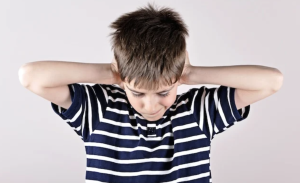A new study by universities in the US, Iceland, and Sweden sheds light on another unknown aspect of misophonia. In this research study, the authors investigated psychological factors that contribute to the emotional and behavioral symptoms experienced by young people with misophonia. The researchers aimed to understand how sensory sensitivity, cognitive emotion regulation (how individuals manage their emotions), and misophonia severity relate to internalizing symptoms (like anxiety and depression) and externalizing symptoms (like aggressive behavior) among these young individuals.
The study found that sensory sensitivity, which is a heightened responsiveness to sensory stimuli, and age were significant predictors of internalizing symptoms. This suggests that youth with misophonia who are more sensitive to sensory input are more likely to experience emotional symptoms. Similarly, sensory sensitivity and a specific way of dealing with emotions called “Other-Blame” were predictors of externalizing symptoms, like aggressive behavior. This means that young people who are more sensitive to sensory experiences and tend to blame others for their emotions are more prone to externalizing problems.

The image was adopted from: www.brainbalancecenters.com
Surprisingly, the study didn’t find a direct link between the severity of misophonia symptoms and the internalizing symptoms. Instead, sensory sensitivity seemed to be a more important factor in predicting these emotional symptoms. This implies that it’s not just the intensity of misophonia triggers, but also how sensitive individuals are to sensory experiences in general that affects their emotional well-being.
The study also explored how individuals regulate their emotions and found that some ways of coping, like “Self-Blame,” “Acceptance,” “Rumination,” and “Catastrophizing,” were strongly linked to internalizing symptoms. However, these emotion regulation strategies didn’t uniquely predict these symptoms when other factors were considered. This suggests that how young people manage their emotions plays a role in their internalizing symptoms, but it’s not the only factor.
Regarding externalizing symptoms, there was a connection between “Other-Blame” strategy and aggressive behavior. This means that those who tend to blame others for their feelings might be more likely to react aggressively, especially in response to misophonia triggers.
Interestingly, the study suggests that sensory sensitivity is a crucial factor that connects misophonia with psychological symptoms. Young people who are highly sensitive to sensory input might experience stronger emotional and behavioral reactions to various triggers, including misophonia sounds. This could contribute to the development of emotional problems. Additionally, this sensitivity might share common underlying factors with other psychiatric disorders.
The researchers also looked into how a positive way of managing emotions, called “Positive Reappraisal,” might moderate the relationship between misophonia severity and internalizing symptoms. They found that young people with more severe misophonia symptoms who are better at using this positive approach might experience fewer emotional consequences, like depression and anxiety. This suggests that teaching positive ways of handling emotions could be beneficial for those with misophonia.
However, the study has limitations. The participants were mainly female and from specific online support communities, which might not represent the entire population with misophonia. Additionally, the assessments used for misophonia were not fully validated when the study began. The research could be improved by including more diverse participants and conducting longitudinal studies to better understand the relationships over time.
In conclusion, this study emphasizes that sensitivity to sensory experiences, like misophonia triggers, can impact the emotional and behavioral symptoms experienced by young individuals. It suggests that addressing sensory sensitivity and promoting positive emotion regulation strategies could be valuable in helping those with misophonia manage their emotional well-being.
What to do if you have misophonia?
Misophonia is a real and highly debilitating disorder that can have a significant impact on individuals’ lives, and it can be challenging to manage without support. If you or someone you know is struggling with misophonia, it is essential to seek help from healthcare professionals who understand the disorder and can provide effective treatment options.
This review is written by Dr. Mercede Erfanian, PhD, who is a research fellow at Hashir International Specialist Clinics and Research Institute for Misophonia, Tinnitus & Hyperacusis.
